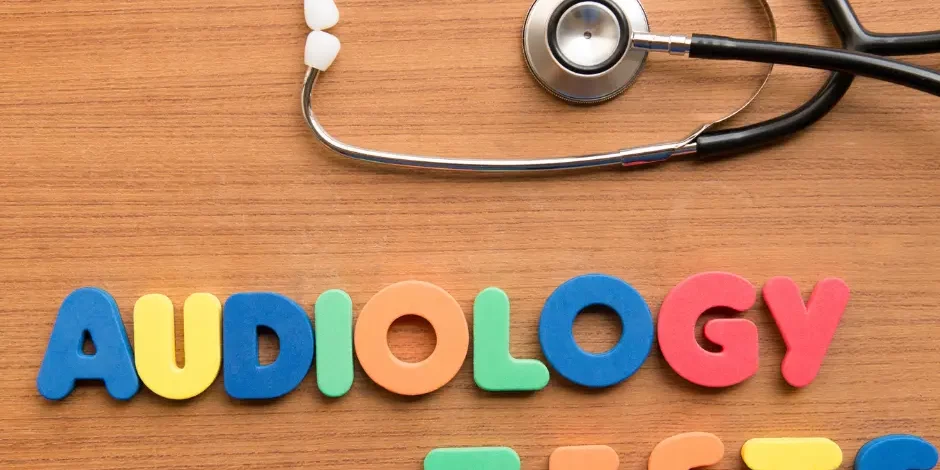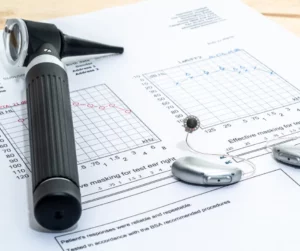What Is Audiology? An Introduction for New Patients

What Is Audiology? Here’s the Definition of Audiology.
Audiology, a specialized branch of science, focuses on hearing, balance, and related disorders. Originating from the Latin word “audīre,” meaning “to hear,” this field offers a comprehensive range of services through expert audiologists. These professionals are adept at diagnosing, treating, and managing hearing and balance disorders in individuals from newborns to the elderly. Let’s delve into the primary services that define audiology.
What Is Audiology? It’s Key Hearing Services.
- Hearing Evaluations: Audiologists use tests like pure tone, speech audiometry, and tympanometry to assess an individual’s hearing capabilities.
- Hearing Aid Fitting and Management: Audiologists play a crucial role in selecting and fitting appropriate hearing aids and providing essential maintenance and use guidance.
- Balance Function Assessments: Techniques such as the Romberg test and gait analysis are employed to evaluate an individual’s balance.
- Tinnitus Management: Those experiencing tinnitus, often characterized by ringing or buzzing in the ears, can receive specialized counseling and treatment.
- Vestibular Rehabilitation Services: Aimed at improving coordination and stability, these services assist individuals with balance disorders.
- Cochlear Implant Programming: In cases of severe hearing loss, audiologists are skilled in programming cochlear implants, devices designed to stimulate the auditory nerve.
Understanding the pivotal role audiologists play in enhancing the quality of life for those with hearing and balance issues is vital. Seeking consultation with an audiologist is recommended for anyone experiencing difficulties in these areas.
Understand more about types of tinnitus.
What Do Audiologists Do? Diagnose and Treat.
Audiologists extend their expertise across all age groups, focusing on improving patient quality of life and communication. Their key services include:
- Customized Hearing Aid Services: Ensuring each hearing aid is perfectly suited to the individual’s unique hearing profile.
- Preventative Care in Hearing Loss: Providing protective devices and educating about the impact of noise.
- Research and Development: Actively contributing to research for advancing the management and treatment of hearing loss, tinnitus, and balance disorders.

What Is Audiology? It’s Diagnostic Hearing Tests.
Central to audiology is the diagnosis of hearing and balance disorders. Audiologists use audiologic diagnostic tools tailored to the individual’s specific symptoms and conditions. These tests play a crucial role in understanding the nature and severity of auditory and balance issues.
What Do Audiologists Do When They Test Your Hearing?
- Pure Tone Audiometry: A fundamental test to assess hearing at various pitches and volumes.
- Speech Audiometry: Evaluates understanding of speech in noisy environments.
- Tympanometry: Examines the eardrum and middle ear function.
- Acoustic Reflex Testing: Measures middle ear response to sound.
- Otoacoustic Emissions (OAEs): Assesses cochlear function.
- Auditory Brainstem Response (ABR): Evaluates the auditory nerve’s transmission of sound to the brain.
- Vestibular Evoked Myogenic Potentials (VEMPs): Tests the vestibular system for balance disorders.
- Bone Conduction Testing: Identifies the nature of hearing loss.
Audiology tests are generally painless and non-invasive. These tests are conducted in soundproof environments and guided by audiologists who ensure patient comfort and understanding. The selection of tests is personalized, depending on each patient’s specific needs.
What Do Audiologists Do? Improve Your Quality of Life
Audiology plays a critical role in enhancing various aspects of daily life, particularly for those dealing with hearing loss, balance issues, or tinnitus. Its impact on overall quality of life is significant, encompassing several key areas:
Improving Communication and Social Interaction:
Effective audiology leads to clearer communication, which is essential for better social interactions and active participation in social events. This enhancement in communication abilities not only enriches social life but also helps to reduce feelings of isolation, thereby fostering emotional well-being and strengthening social connections.
Boosting Educational and Career Opportunities:
For students, audiology services significantly aid in understanding and participating in academic activities, enhancing learning and academic success. In the workplace, improved hearing is crucial for effective communication with colleagues and clients, potentially opening avenues for career advancement and greater job satisfaction.
Enhancing Safety and Environmental Awareness:
Audiology increases awareness of environmental sounds, such as traffic and alarms, which is vital for personal safety and effective navigation in day-to-day activities.
Contributing to Mental Health and Cognitive Health:
Addressing hearing issues is key in combating social isolation, often a consequence of hearing loss. Consequently, reconnecting individuals with their community through improved hearing aids in better mental health. Moreover, there is evidence that managing hearing loss can reduce the risk of cognitive decline and dementia, thereby promoting long-term brain health.
Enriching Leisure and Recreational Activities:
The enjoyment of leisure activities, like listening to music, attending live events, or engaging in outdoor activities, is greatly enhanced by improved hearing, adding to the overall quality of life.
Overall Impact on Life Satisfaction:
In fact, audiology significantly influences various facets of life, from personal interactions and safety to professional growth and mental well-being. For those experiencing issues related to hearing or balance, consulting with an audiologist or a doctor is an important step toward achieving a more fulfilling and satisfying life.
Get ready for holidays with hearing aids by contacting your local audiologist.

Stanford Hearing: Your Partner in Audiology Care
At Stanford Hearing, audiology is more than a medical practice; it’s a commitment to improving life satisfaction and fostering better connections. So if you’re facing challenges with hearing or balance, contact Stanford Hearing for assistance. Our team of expert audiologists is dedicated to providing the highest standard of care and guiding you toward a life enriched with better hearing and overall well-being.
